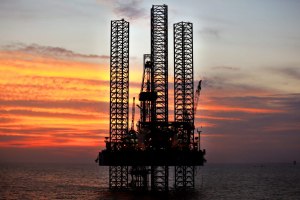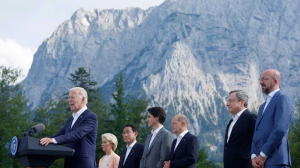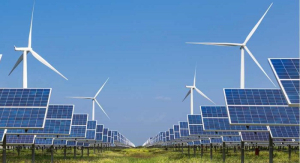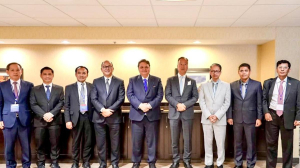Outreach to controversial regimes seeks to increase global oil supplies
The leaders of Western industrialized nations have acknowledged that isolating Russia economically for its invasion of Ukraine has significant adverse consequences for their economies, including dramatic increases in the prices of oil and natural gas. Europe faces potential shortages of natural gas this winter, as Russia restricts its supplies in retaliation for European support for Ukraine. U.S. and European political leaders have argued for accelerating the development of renewable energy sources, but U.S. officials have also sought, at least in the short term, to identify readily available additional supplies of fossil fuels to lower prices.
A handful of autocratic regimes, some of whom maintain adversarial relations with the U.S. have spare crude oil capacity available that could potentially enter global markets quickly. Saudi Arabia has spare oil production capacity and is not under any formal U.S. or European economic sanctions, but its de-facto leader, Crown Prince Mohammad bin Salman (MBS), has been subjected to a policy of isolation by U.S. and European leaders for his role in the 2018 killing of Saudi journalist Jamal Khashoggi. More than one year after characterizing MBS as a “pariah” for his role in the assassination, as well as the Saudi military intervention in Yemen, and a series of alleged human rights abuses, President Biden will meet with MBS and his father King Salman on July 16, as part of a broader meeting with Gulf and other Arab leaders. U.S. officials deem engagement with MBS on issues on which the United States and Saudi Arabia have long cooperated - including global oil production, conflict in Yemen and the months-long ceasefire there, Iran, Israeli-Palestinian issues, and terrorism - as outweighing arguments against the visit. It must be asked, however, to what degree Saudi and U.S. interests overlap on these issues, especially given President Biden’s declared policies opposing autocracy and advocating for renewable energy transition. Although attempting to persuade Saudi Arabia to add oil to global markets is a key U.S. objective of the summit meeting, some argue that Saudi spare oil production capacity has been widely overestimated at 1 million barrels per day - and may instead be as few as 150,000 barrels of oil per day. Still, any increase in production will help to relieve pressure on prices and reduce economic strain in the short term.
Two other significant oil exporters - Iran and Venezuela – are longtime US adversaries that have been subjected to comprehensive U.S. energy and other sanctions. Both are members of the Organization of Petroleum Exporting Countries (OPEC), of which Saudi Arabia is the de-facto leader, and both are exporting far less oil than they could under established agreements within and outside the OPEC cartel. Even though easing sanctions on the two could relieve strained oil markets, significant U.S. constituencies oppose lifting U.S. sanctions on Tehran and Caracas. Many argue that easing sanctions against Iran would provide the regime with more revenue to train, equip, and support regional armed factions and expand its nuclear and missile program. Venezuelan President Nicolas Maduro’s regime is widely condemned in the U.S. for maintaining close ties with Cuba, as well as for accusations of significant human rights abuses and refusing to abide by the results of elections.
Since mid-2021, long before the Russian invasion of Ukraine, U.S. officials have been negotiating with Iranian counterparts to restore full mutual compliance with the 2015 multilateral Iran nuclear deal, which the Trump administration exited in 2018. Although restoring strict limits on Iran’s nuclear program remains the primary objective of the ongoing talks, the easing of U.S. sanctions that would accompany an accord would enable Iran to put more than 1 million barrels per day of additional oil on world markets. The main remaining obstacle to restoring the agreement is Iran’s demand that the 2019 designation of Iran’s Islamic Revolutionary Guard Corps (IRGC) as a foreign terrorist organization (FTO) be revoked. U.S. officials have refused the demand, perhaps in order to avoid accusations of being “soft” on terrorism, and they have continued to designate small regional and Asian oil traders as sanctioned entities for conducting business with Iran. China is buying the overwhelming majority of Iran’s oil, and U.S. officials have deliberately avoided sanctioning major Chinese banks or other entities that have a presence in the U.S. financial system, causing China’s leaders to conclude that the United States will not act to stop Iranian oil from reaching world markets. Accordingly, Iranian oil and oil products exports have steadily increased to approximately 1 million barrels per day, according to Iranian oil officials. Iran’s baseline oil export level, if all sanctions were removed, is over 2 million barrels per day.
The Maduro regime in Venezuela is one of Iran’s closest partners in the western hemisphere, but Venezuela’s oil industry has deep ties to the United States. Venezuela’s energy exports are hamstrung by U.S. sanctions, but the existing infrastructure there also suffers from a lack of maintenance, further reducing their net export capacity. U.S. officials insist that any broad lifting of U.S. sanctions is contingent on substantive political reform, but they have been willing to engage the Maduro regime in the interests of setting conditions for future reform. Recent confidence-building measures, such as obtaining the release of Americans held in Venezuela, and adding incremental supplies to the global oil market have helped to re-establish dialogue between the two countries. In May, as a gesture to encourage negotiations between the Maduro government and the opposition, the United States authorized U.S. oil major Chevron to negotiate "the terms of potential future activities in Venezuela" with Venezuela’s state-owned Petroleos de Venezuela S.A. (PDVSA). This license agreement signaled that the United States might at some point allow a resumption of Venezuelan oil importation into the United States. In June, the United States eased sanctions, imposed in 2019, to allow European majors Repsol and Eni to export oil from Venezuela to Europe as payment for Venezuelan debt. Although U.S. policies toward fossil fuel-rich autocratic states remain too constrained by preexisting geopolitical interests and democratic considerations to restore stability to global energy markets, U.S. outreach and sanctions easing, coupled with aggressive efforts to accelerate the energy transition, will help to lessen economic pain for countries seeking to reduce their energy dependence on Russia.
Already have an account? Sign In
-
Start reading
Freemium
-
Monthly Subscription
30% OFF$26.03
$37.19/MonthCancel anytime
This offer is open to all new subscribers!
Subscribe now -
Yearly Subscription
33% OFF$228.13
$340.5/YearCancel anytime
This offer is open to all new subscribers!
Subscribe now






